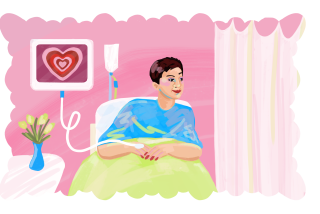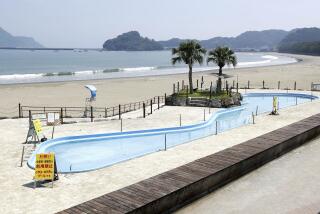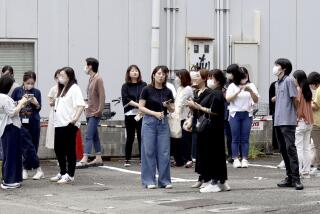Japan disaster: UCLA doctor talks about medical mission
When the earthquake struck Japan, Dr. Kozue Shimabukuro, a pediatric critical care doctor at Mattel Children’s Hospital UCLA in Westwood, had a radical change of plans. A visit to family near Tokyo was scrubbed for a medical mission. Shimabukuro has joined a pediatric disaster relief team.
On Monday, she talked about the work awaiting her as she prepared to leave Tokyo for Yamada in northern Iwate prefecture.
Question: What will you be doing in Yamada?
Answer: Yamada city is actually right by the sea, and it was hit pretty hard, one of the worst hit. Now that it’s been already a week after the disaster, the rescue team has left. We are starting to see a lot of asthma, pneumonia -- people have been sleeping in the cold weather without heat and are starting to get sick. My training is pediatric ICU. And if they need transport we will do that, although I don’t know how that will work. Without the gasoline, I don’t know how that is going to work.
Q: Why was your trip north delayed?
A: Because of the [nuclear crisis at] Fukushima power plant, we couldn’t travel by land, we had to arrange to travel by air, so now we have done that.
Q: Are you worried about nuclear radiation from Fukushima?
A: The Japanese government evacuated the area, but then the U.S. government recommended a different area, 80 kilometers. There’s the discrepancy between the two governments. Initially, I was concerned which information to go by. But also I don’t think we can ignore the fact that there are people left behind who can’t be evacuated. I know my team leader has gone through that area [inside the 12-mile evacuation zone]. Most of the people who are near there, near the power plant in Fukushima, are very elderly. I know many of my colleagues have said that if there is need there, they will go, and I agree. If there is need, we will go. But the Japanese government has said no one under age 45 should go there.
Q: How old are you?
A: I’m 34.
Q: Had you planned to return to treat patients in Japan?
A: That’s always been my goal, to come back and serve Japan. I came (to the U.S) when I was 18, I got a government scholarship. My parents couldn’t afford to send me to school. Then after my scholarship ran out, I kept getting scholarships. But without my government’s help, I would not have become a doctor. So I wanted to come back and help Japan.
Q: Is your family safe?
A: Yes, they are all safe. They are in the south, in Okinawa. But they worry about me in the north.
Q: Do you remember the Kobe earthquake? How does this compare to that?
A: I think it’s worse, this is definitely worse. Talking to people in the government, in the ministry of health, they said we thought we were prepared after Kobe, but we were not. Nobody expected this much loss.
Q: How long do you plan to stay?
A: That’s a hard question. I don’t know ? about a month. It’s really nerve-wracking -- when will we get pulled out? Because this is not going to be just a month, two months -- it’s going to be a whole year. So we need to make sure we don’t get burned out. So that’s what we’re talking about -- how we rotate to be effective.
Q: What do you think you will find in Yamada?
A: A lot of hospitals and university hospitals have been stricken by the earthquake and tsunami. Initially, there were a lot of disasters relief teams from overseas, and everyone was focused on rescuing survivors. Now I think our focus will be, can we get the daily medical needs met -- hypertension drugs for adults, asthma for children; now that it’s snowing, how do we prevent hypothermia? Even just small things like pneumonia -- that’s hard to deal with if you don’t have medication.
There’s kids awaiting cardiac surgery; how are we going to transport that kid to a hospital? There’s kids with tumors -- how are we going to transport them out so they get adequate care? When the disaster hits ... people want to help. But now it’s trying to get people who want to serve in those remote areas of the country. We just got a phone call from the doctors there. They said there is very scant resources and electricity. They use oil heaters, and there’s only one pediatrician in that area. There was two but the other one got burned out.
Q: Where will you be based?
A: People can’t come to the clinic because there is no gasoline, so we are going to have to go to them. People over there keep saying expect everything, expect anything.
More to Read
Sign up for Essential California
The most important California stories and recommendations in your inbox every morning.
You may occasionally receive promotional content from the Los Angeles Times.











